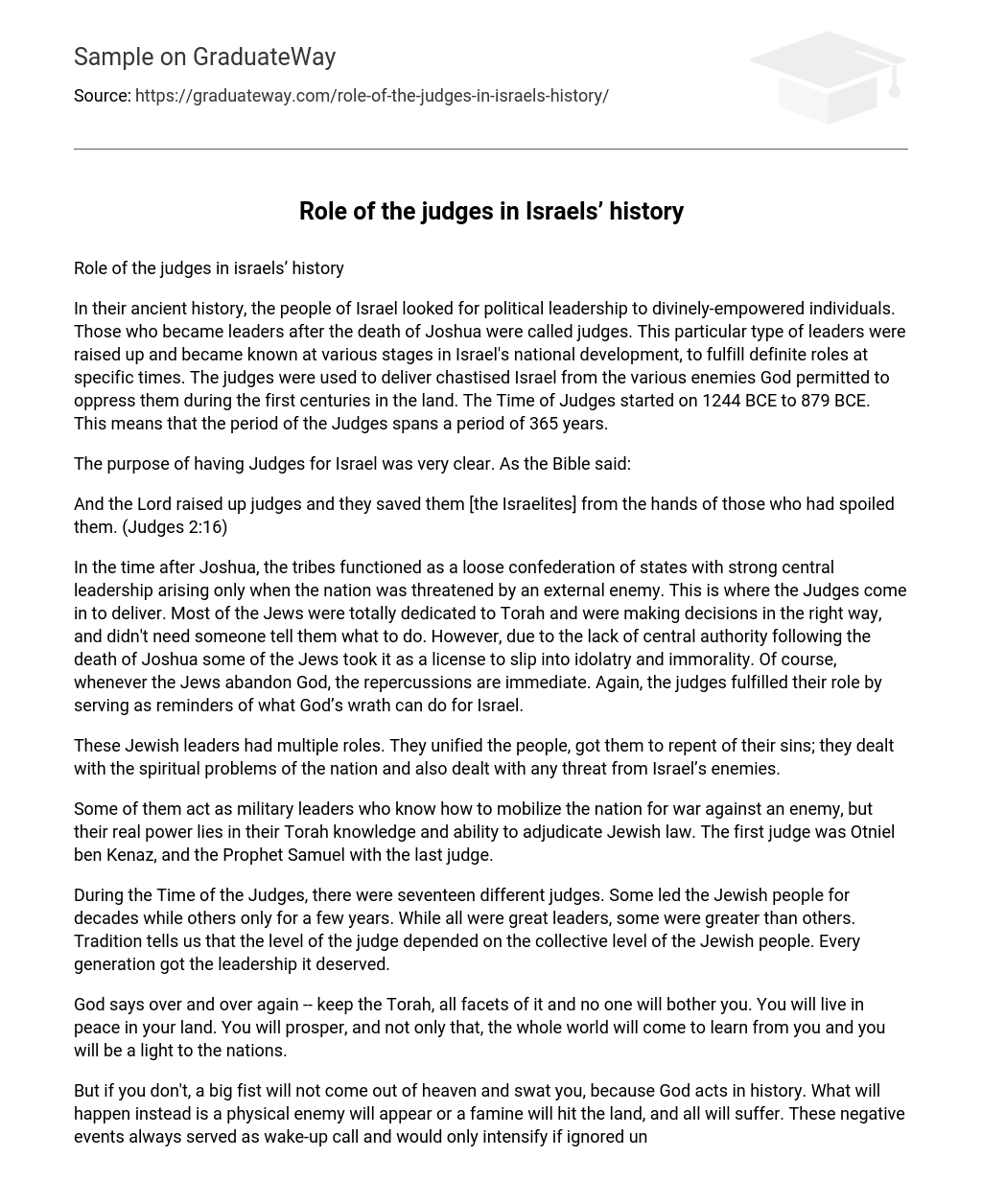In their ancient history, the people of Israel looked for political leadership to divinely-empowered individuals. Those who became leaders after the death of Joshua were called judges. This particular type of leaders were raised up and became known at various stages in Israel’s national development, to fulfill definite roles at specific times. The judges were used to deliver chastised Israel from the various enemies God permitted to oppress them during the first centuries in the land. The Time of Judges started on 1244 BCE to 879 BCE. This means that the period of the Judges spans a period of 365 years.
The purpose of having Judges for Israel was very clear. As the Bible said:
And the Lord raised up judges and they saved them [the Israelites] from the hands of those who had spoiled them. (Judges 2:16)
In the time after Joshua, the tribes functioned as a loose confederation of states with strong central leadership arising only when the nation was threatened by an external enemy. This is where the Judges come in to deliver. Most of the Jews were totally dedicated to Torah and were making decisions in the right way, and didn’t need someone tell them what to do. However, due to the lack of central authority following the death of Joshua some of the Jews took it as a license to slip into idolatry and immorality. Of course, whenever the Jews abandon God, the repercussions are immediate. Again, the judges fulfilled their role by serving as reminders of what God’s wrath can do for Israel.
These Jewish leaders had multiple roles. They unified the people, got them to repent of their sins; they dealt with the spiritual problems of the nation and also dealt with any threat from Israel’s enemies.
Some of them act as military leaders who know how to mobilize the nation for war against an enemy, but their real power lies in their Torah knowledge and ability to adjudicate Jewish law. The first judge was Otniel ben Kenaz, and the Prophet Samuel with the last judge.
During the Time of the Judges, there were seventeen different judges. Some led the Jewish people for decades while others only for a few years. While all were great leaders, some were greater than others. Tradition tells us that the level of the judge depended on the collective level of the Jewish people. Every generation got the leadership it deserved.
God says over and over again — keep the Torah, all facets of it and no one will bother you. You will live in peace in your land. You will prosper, and not only that, the whole world will come to learn from you and you will be a light to the nations.
But if you don’t, a big fist will not come out of heaven and swat you, because God acts in history. What will happen instead is a physical enemy will appear or a famine will hit the land, and all will suffer. These negative events always served as wake-up call and would only intensify if ignored until they reached the level where they were impossible to ignore.
When bad things happen to Jews, it is never by chance. It is always a consequence of Jewish actions, and therefore, the remedy is never to deal solely with the external threat. If an enemy attacks, defense is in order, but so is introspection; the presence of enemy is only a symptom of a deeper problem that must be dealt with. This cause and effect relationship repeats itself over and over again throughout the period of the Judges and continues throughout Jewish history until today.
The Time of Judges comes to a close with Samuel as the last judge. Samuel functions as a leader for 13 years and the last of two years he actually co-leads the Jewish people with the first Jewish king whose name is Saul.
Reference
Spiro R. K. (2007). Crash Course on Jewish History: The Time of the Judges. Retrieved from http://www.aish.com/literacy/jewishhistory/Crash_Course_in_Jewish_History_Part_15_-_The_Time_of_the_Judges.asp on December 1, 2008.





